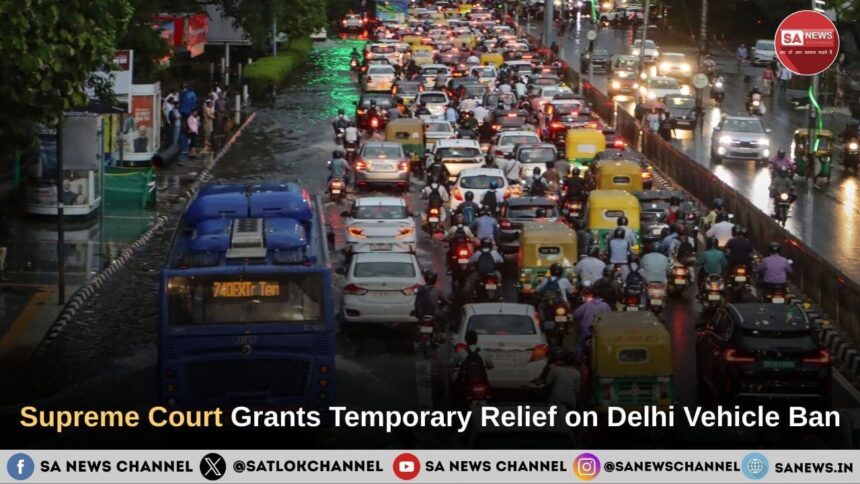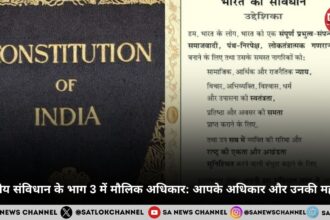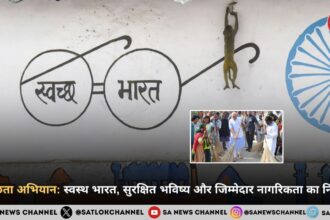The Supreme Court has provided temporary relief on the Delhi vehicle ban. Diesel vehicles older than 10 years and petrol vehicles older than 15 years will not face coercive action for the next four weeks. The Delhi government, represented by the Attorney General, requested reconsideration of the 2018 blanket ban. The SC will review the policy after seeking responses from the Centre and CAQM.
- Key Points and Latest Update on Delhi Vehicle Ban by Supreme Court
- Supreme Court Grants Temporary Relief on Delhi Vehicle Ban, Reviews Policy After Attorney General’s Request
- Request for Reconsideration
- Supreme Court’s Response
- Background of the controversy
- Temporary Relief
- What’s Next
- Spiritual Reflection
- FAQs about Temporary Relief on Delhi Vehicle Ban
Key Points and Latest Update on Delhi Vehicle Ban by Supreme Court
1. The Delhi government requested the Supreme Court to reconsider the 2018 vehicle ban policy.
2. The Attorney General represented the Delhi government and urged reconsideration, citing the blanket nature of the ban.
3. The Supreme Court sought responses from the Centre and the Commission for Air Quality Management (CAQM).
4. Temporary relief granted for 4 weeks; no coercive action during this period.
5. SC will deliver the final verdict after reviewing policy and responses.
6. The current debate emphasizes regulating vehicles based on emissions and usage, not just age.
Supreme Court Grants Temporary Relief on Delhi Vehicle Ban, Reviews Policy After Attorney General’s Request
The Supreme Court of India has granted temporary relief to owners of older vehicles in Delhi-NCR after the Attorney General requested a reconsideration of the 2018 blanket ban. Under the interim order, no coercive action will be taken against diesel vehicles older than 10 years and petrol vehicles older than 15 years for the next four weeks.
Request for Reconsideration
The Delhi government, represented by the Attorney General, urged the Supreme Court to reconsider the 2018 ban, calling it a blanket policy that does not distinguish between private and commercial vehicles. A car used occasionally by a family and a vehicle running commercially all day were treated the same under the age-based rule, despite their vastly different pollution impacts. The government proposed that regulations should focus on emission levels and usage patterns rather than age alone.
Supreme Court’s Response
The Supreme Court passed an interim order providing four weeks of temporary relief while it reviews the policy. The court has also sought responses from the Centre and the Commission for Air Quality Management (CAQM) before making a final decision. This is not a permanent rollback, and future hearings may result in an emission-based framework for vehicle regulation.
Background of the controversy
The controversy dates back to the National Green Tribunal (NGT), which first ordered restrictions on old vehicles to combat rising pollution in Delhi-NCR. The Supreme Court’s 2018 order imposed a blanket ban on:
- Diesel vehicles older than 10 years
- Petrol vehicles older than 15 years
- On 12 August 2025, the Delhi government requested the Supreme Court to reconsider this ban, calling it arbitrary and outdated in the era of BS-VI norms.
Temporary Relief
During this four-week relief period, no coercive action will be taken against affected vehicles. Vehicle owners are advised to comply with pollution norms and await the court’s final verdict.
What’s Next
The Supreme Court has granted temporary relief for four weeks, during which no coercive action will be taken against affected vehicles. Meanwhile, the court has requested responses from the Centre and the Commission for Air Quality Management (CAQM) before reconsidering the 2018 blanket ban. This is not a permanent rollback, and the policy may be modified or replaced with an emission-based framework after the next hearings.
Spiritual Reflection
Air pollution, old age, and illnesses are challenges of living in this perishable world. Tatavdarshi Sant Rampal Ji Maharaj ji explains that true liberation from these worldly problems comes only through receiving authentic spiritual knowledge and practicing the correct way of worship, ultimately attaining Satlok, the eternal abode. Learn more and download the Sant Rampal Ji Maharaj app.
FAQs about Temporary Relief on Delhi Vehicle Ban
Q1. What is an interim order?
A: An interim order is a temporary decision by the Court until a final verdict is delivered.
Q2. What is AQI?
A: AQI (Air Quality Index) measures air pollution levels.
0–50 = Good
51–100 = Satisfactory
101–200 = Moderate
201–300 = Poor
301–400 = Very Poor
401–500 = Severe
Q3. Which Indian cities have the best and worst AQI?
A: Best AQI – Shillong, Aizawl, Kohima
Worst AQI – Delhi, Ghaziabad, Bhiwadi, Faridabad, Noida
Q4. Is the ban applicable only in Delhi?
A: Yes, it currently applies only to Delhi-NCR; other states have their own rules.
Q5. Can BS3 and BS4 vehicles operate in Delhi?
A: Yes, BS3 petrol and BS4 diesel vehicles are allowed on the roads.









